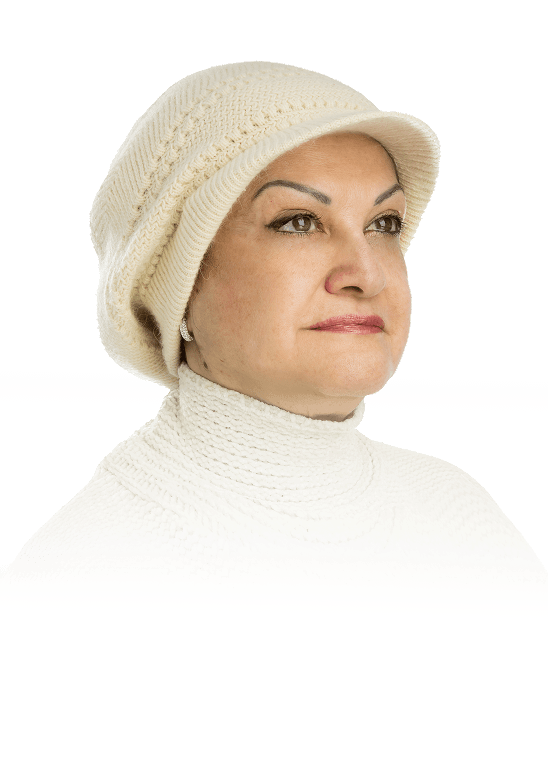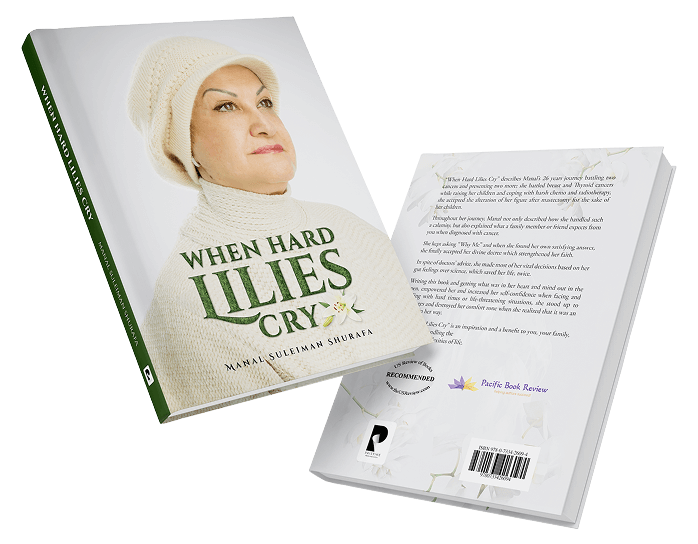
Meet Manal Shurafa
Manal Shurafa is an American Muslim of Palestinian heritage, born in Qatar and now living in Philadelphia, Pennsylvania. With a pharmacist background and a life enriched by diverse cultural experiences, she brings a unique perspective to her writing.
Her debut book, When Hard Lilies Cry, is a powerful memoir chronicling her journey through breast and thyroid cancer, her unwavering faith, and her devotion to her family.
A Life of Resilience
Manal’s journey is a testament to strength and sacrifice. She chose to step away from her career as a pharmacist to dedicate herself fully to raising her two children. Her experiences, shaped by hardship and perseverance, have empowered her to inspire others through her story.
Faith and Legacy
Through her memoir, Manal hopes to inspire readers to uncover the blessings within their struggles and to approach life’s challenges with faith, courage, and love.

Pacific Book Review – When Hard Lilies Cry
The memoir When Hard Lilies Cry by Manal Suleiman Shurafa is an honest, sincere, and poignant story of her traumatic experience and the torturous events that followed her diagnosis of two distinct malignancies.
Shurafa, a Palestinian American born in 1961 in Qatar, always laughedher way through the hardships which life threw at her. That soon changed, though, when she went to see her doctor after finding alittle, apricot-sized stone-sized lump in one of her breasts. Despite all signs suggesting a possible cancerous condition, she made a concerted effort to persuade herself that it could not be anything since, at 35, chronic illnesses of that nature do not usually strike people in her age range. Her worst concerns were, unfortunately, validated by the results of a surgical biopsy.
Her quest for medical care severely disrupted her normal undertakings as a wife and mother. She, however, made the decision to hide her pain and make a greater effort to handle and bear it on her own. One day, while doing house cleaning, she felt a sharp pain in her chest. Fearing she had a blood clot, she made an urgent trip to the hospital, where she was quickly assisted. The discovery of a thyroid lump nine months after the first diagnosis further startled her. Following a needle biopsy, which she had insisted upon, the findings suggested that she would have to face the surgeon’s scalpel once again in order to survive. The narrator emerges as a strong lady who endured emotional, psychological, and mental suffering in addition to overcoming severe physical injuries. Her decision to refrain from sharing her pain with close family members is a clear example of her altruism. Her persistence, bravery, and unwavering commitment are all visible till the very end of the book, and her faith is absolutely amazing – even in the face of her children’s disappointment since they believed God had let them down. Her story, which encompasses years of tears and intense grief, emphasizes the need to often check on sick relatives and friends, regardless of how strong they appear on the outside. It also promotes faith in God, optimism, and a readiness to look at the bright side of every circumstance.
When Hard Lilies Cry is more than just a memoir; it is a tribute to unprecedented sacrifice. It chronicles 27 years of an altered life and is replete with life-changing insights that will encourage readers who have given up hope to dare rediscover meaning and hope for living. When Hard Lilies Cry is a story of perseverance, self-discovery, enduring strength and having faith in God. Manal Suleiman Shurafa’s writing is one of grace and honesty, making this book a compelling read for anyone who has ever faced their own moments of darkness and found a way to the light.
Despite her pain, Shurafa remained resilient, choosing to protect her family from her suffering while holding onto faith and perseverance. Her story serves as a powerful reminder of the strength within us, the importance of checking in on loved ones, and the healing power of faith and optimism.
More than a memoir, When Hard Lilies Cry is a tribute to sacrifice, hope, and the enduring will to survive. A compelling read for anyone seeking inspiration in the face of adversity.
US Review of Books – When Hard Lilies Cry
“Do you know what it means to die every day while still being alive?”
In this spirited glimpse into the resolve of the human experience, Shurafa delivers a raw and authentic account of battling not one but two cancer diagnoses and the toll that it takes not only on the physical well-being but also on the mental and emotional. The vulnerability with which her words grace the page endears her to readers, yet the deafening nature of facing such a stark and sobering reality in the prime of one’s life at merely thirty-five pales in comparison to the author’s tenacity to be present for her loved ones.
From a narrative standpoint, Shurafa’s persistence in getting a biopsy, despite being cleared by her doctor multiple times, is a testament to her warrior spirit and the key catalyst for catching her breast cancer diagnosis in a timely manner. More a memoir than a biographical account, Shurafa’s writing flows seamlessly, helping the central themes of her work shine through. For instance, predicated on faith, her mindset was to control what she could and not fret about what she couldn’t. While this mindset was tested time and time again, and in the most excruciating of ways, one can characterize her efforts as nothing short of valiant.
Another subtheme that is embedded in the underlying experiences is the necessity to advocate for one’s self, which is especially magnified in her interactions with medical personnel. At every point in her health discovery and journey, Shurafa is unafraid to let her voice be heard to ensure that her peace of mind is a top priority. At the opening, the author creates the visual of an ideal family, from a loving husband, Osama, to two doting kids—Ayman and the younger Hisham. Conjure the thought of having this ripped to shreds and having to mourn the life that could have been while still needing to find a way to fully live the life that is. In one of the most innocent but poignant moments, Ayman asks Shurafa, “Mom, are you going to grow another breast?” The thought of having to explain to young children the concept or even the possibility of death is a daunting one. In the case of Ayman and Hisham, it is seeing them detach emotionally to safeguard the immense depth of pain they would feel if they lost their mother.
For Shurafa, reading the Holy Qur’an became one of the sources of her calm and healing, but even more so, the act of writing was the most defining therapeutic act. Through the prism of her writing, audiences become privy to the pure humanness of fighting through cancer and experiencing everything from fear to resolve. Seeing the author’s journey in words presents a sense of completeness, a coming full circle of sorts. Though just a metaphor, her evolution from being a soft lily who revolves her life around the love of family to a hard lily, toughened by life, always returns to the notion that the softness will remain, only now it will be on the inside. Above all else, there is something here to be gleaned for readers at all points in their lives: a type of compass that can help them find value in their existence and find their own soft lilies inside their hardened exteriors. Though the topic is heart-wrenching in nature, the manner in which Shurafa delivers it is graceful and compelling, making for an undeniable must-read.